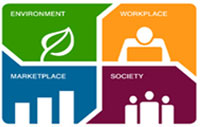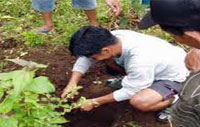Focus Area
 “As of 2011, 250 million children – one in four young people living in lower and middle income countries – were unable to read a single sentence”
“As of 2011, 250 million children – one in four young people living in lower and middle income countries – were unable to read a single sentence”
-Education is a fundamental human right: Every girl and boy is entitled to it-
Quality education is critical to development both of societies and of individuals, and it helps pave the way to a successful and productive future. When all children have access to a quality education rooted in human rights and gender equality, it creates a ripple effect of opportunity that influences generations to come. A quality basic education equips girls and boys with the knowledge and skills they need to adopt healthy lifestyles, protect themselves from various deceases and take an active role in social, economic and political decision-making as they transition to adolescence and adulthood. Educated adults are more likely to have smaller and healthier families, to be informed about appropriate child-rearing practices and to ensure that their children start school on time and ready to learn.
We at Divjot support development of national capacities to reduce gender and other disparities and discrimination against children who are out of school. This includes girls; children from poor households or living in rural areas; children belonging to ethnic and linguistic minorities, indigenous groups and castes facing discrimination; and children affected by various deceases or disabilities.
For us, equity means that all children have an opportunity to survive, develop and reach their full potential, without discrimination, bias or favoritism. This interpretation is consistent with the Convention on the Rights of the Child, which pledges the fundamental rights of every child.
 According to the latest estimates of the WHO/UNICEF Joint Monitoring Programme for Water Supply and Sanitation (JMP), released in early 2013 (collected in 2011), 36 per cent of the world’s population – 2.5 billion people – lack improved sanitation facilities, and 768 million people still use unsafe drinking water sources. Inadequate access to safe water and sanitation services, coupled with poor hygiene practices, kills and sickens thousands of children every day, and leads to impoverishment and diminished opportunities for thousands more.Poor sanitation, water and hygiene have many other serious repercussions. Children – and particularly girls – are denied their right to education because their schools lack private and decent sanitation facilities.
According to the latest estimates of the WHO/UNICEF Joint Monitoring Programme for Water Supply and Sanitation (JMP), released in early 2013 (collected in 2011), 36 per cent of the world’s population – 2.5 billion people – lack improved sanitation facilities, and 768 million people still use unsafe drinking water sources. Inadequate access to safe water and sanitation services, coupled with poor hygiene practices, kills and sickens thousands of children every day, and leads to impoverishment and diminished opportunities for thousands more.Poor sanitation, water and hygiene have many other serious repercussions. Children – and particularly girls – are denied their right to education because their schools lack private and decent sanitation facilities.
We at Divjot gives emphasis on Information, Education and Communication (IEC) for basic sanitation including a thrust on school sanitation as an entry point for encouraging wider acceptance of sanitation by rural masses as key strategies. We also lay emphasis on school sanitation and hygiene education for bringing about attitudinal and behavioral changes for relevant sanitation and hygiene practices from a young age.
“On Sanitation area of focus” our vision is that all Government, private aided and unaided Schools and Anganwadis must have functional and clean toilets and urinals. All co-educational schools above primary level must have separate urinals and toilet blocks for boys and girls. Adequate Toilets and urinals should be available separately for boys and girls.
We are working to improve water supplies and sanitation facilities in schools and communities, and to promote safe hygiene practices. This will not only help our country to become a “Clean India” but will also give us the strength to fight against malnutrition and depraved health conditions.
 We at Divjot help corporates by designing and working out the framework to implement their CSR projects and ensures that the resources are allocated & reached to the need base.
We at Divjot help corporates by designing and working out the framework to implement their CSR projects and ensures that the resources are allocated & reached to the need base.
Business dictionary defines CSR as "A company’s sense of responsibility towards the community and environment in which it operates. Companies express this citizenship through their waste and pollution reduction processes by contributing educational and social programs and by earning adequate returns on the employed resources.
An efficient and trusted partner at the grassroots level with direct access to beneficiaries is one of the most important components of a successful CSR Project.
In a time during which companies have become more and more powerful and influential, the Divjot Organization for Social Empowerment (DOSE) realizes that the most effective way to build a sustainable future for the communities is neighboring the industrial areas when companies and NGOs – next to other stakeholders including the government – join forces to ensure the wellbeing of these communities. The goal of the CSR-activities of Divjot is to minimize any negative impact. Another goal is to stimulate and encourage the corporate sector to contribute positively to the process of empowering the deprived sections of society.
 We work towards identifying the root causes of healthcare challenges, provide innovative solutions, and help implement secure and quality healthcare services in India.Indian Health care system is just a nominal health care system; there are not enough hospitals, doctors, medical staff, medicines or ambulance services available in the system. Quality of care and accessibility is very poor. Most people depend on private hospitals for health care except very poor people, who depend on government hospitals because they can't afford private out of pocket health care.
We work towards identifying the root causes of healthcare challenges, provide innovative solutions, and help implement secure and quality healthcare services in India.Indian Health care system is just a nominal health care system; there are not enough hospitals, doctors, medical staff, medicines or ambulance services available in the system. Quality of care and accessibility is very poor. Most people depend on private hospitals for health care except very poor people, who depend on government hospitals because they can't afford private out of pocket health care.
According to a 2005 report, 42% of India’s children below the age of three were malnourished, which was greater than the statistics of sub-Saharan African region of 28%. It is considered that one in every three malnourished children in the world lives in India. The estimate varies within the country. It is estimated that, Madhya Pradesh is having the highest rate of 55% and Kerala the lowest with 27%. Although India’s economy grew 50% from 2001–2006, its child-malnutrition rate only dropped 1%, lagging behind countries of similar growth rate. Malnutrition can be described as the unhealthy condition that results from not eating enough healthy food
Delivering healthcare to over a billion people is a very complex challenge. DOSE works in close collaboration with State and Central Government and other partner organizations to secure accessible and quality maternal and child healthcare among marginalized communities.
We at Divjot believe that a healthy mother and a healthy baby is the route to a productive, developed nation. Hence, DOSE has specially focused upon providing comprehensive solutions to address public health problems. We promote essential new born care and immunization, reduce malnutrition, prevent infant and maternal deaths and protect those affected by or susceptible to HIV/ AIDS and TB. DOSE works closely with its partners to achieve good health care for everyone.
 Most of the people in villages earn their living either through agriculture or handicrafts. Since the land available to each family has remained the same and the number of family members has grown, supporting all of them through agriculture alone is becoming difficult. People are moving to towns and cities in search of jobs, but these are also not always available partly because they lack the qualifications. The government is addressing these problems by taking steps to make better farming techniques available to increase crop production from the same piece of land, and also making other opportunities of employment and livelihood available close to or within the villages itself. It is also encouraging young people to start their own ventures by providing them training and finance.
Most of the people in villages earn their living either through agriculture or handicrafts. Since the land available to each family has remained the same and the number of family members has grown, supporting all of them through agriculture alone is becoming difficult. People are moving to towns and cities in search of jobs, but these are also not always available partly because they lack the qualifications. The government is addressing these problems by taking steps to make better farming techniques available to increase crop production from the same piece of land, and also making other opportunities of employment and livelihood available close to or within the villages itself. It is also encouraging young people to start their own ventures by providing them training and finance.
Divjot works closely with the people to enhance their employability skills and provides them with training. We at DOSE aim to uplift the living standard of the people who all are below poverty line by supporting them through Income Generation Activities. We not only help them with training but also helping them to become employable or self-employed. We put special emphasize on self-employment and under which we promote Animal Husbandry, Dairy Development and Fisheries supplement family incomes and generate gainful employment in the rural sector, particularly among the landless laborers, small and marginal farmers and women.
In the livestock sector, major problems faced by farmers relate to breed, feed and fodder, health care and getting good prices for that produce. The National Policy for Farmers envisages addressing these issues.
Others Links
Contact us
Divjot Organization for Social Empowerment (DOSE)
![]() 39-A, IIIrd Floor, Lane No. 14 ,
Sarojini Park Shastri Nagar
Delhi-110031
39-A, IIIrd Floor, Lane No. 14 ,
Sarojini Park Shastri Nagar
Delhi-110031
![]() +91 11 22525099
+91 11 22525099
@ 2015 Divjot all rights reserved
Design and Developed : Bagwar Softwares





